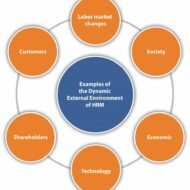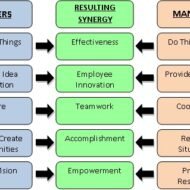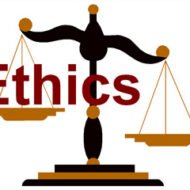Posted by Managementguru in Business Management, Human Resource, Organisational behaviour, Principles of Management
on Mar 20th, 2014 | 0 comments

Changing Trends and Challenges in HRM The very conception of Human resource management has changed tremendously in the recent past as it has taken a new form and shape that embraces each and every activity of the organization, as every action requires human intervention. Human resource has become the most important of all the resources from the point, where it was merely one of the many resources. What has caused this great transformation? What has made firms recognise that manpower is the most important of all resources to the extent of including human resource in their accounting as assets! Evolution of HRM: A thorough analysis of the evolution of human resource management clearly indicates the exceptional quality of manpower, especially managers to tackle the very many challenges that come on their way. A manager who was merely a reporter to the top level management has now become indispensable. The laborers whether skilled or unskilled cannot be treated the way they were treated earlier, as the introduction of many labor laws support their cause. The legal framework guides the organization in terms of pay scale, bonus and increments and supports the workers in their welfare, security and safety. Globalization, Privatization and Liberalization: With the initiation of globalization, privatization and liberalization the firms are exposed to more competition and the managers have to put their think tanks to the best use in order to sustain and succeed in the market. People from various background work together in a multinational firm; their language, dress code, food habits, style of working and adaptability are quite different from one another. A human resource manager must go for a “culture” that is unique to the organization. He has to be proactive in order to safeguard the employees from a “culture shock”, by training them sufficiently before induction. Human behavior: Management of human resources by itself is complex and it needs people with special skills. The unpredictable nature of human behavior makes the job more difficult. In the task of managing the emotions and behavior of his employees, a manager must not lose his composure at any point of time for which he has to be a balanced personality. How many of us are gifted with a balanced state of mind and especially in a crisis situation many of us scream our lungs out and blame others for our own faults. Employee Motivation: Motivating the employees to do the job and steer them in the right direction is a Himalayan task for most of the managers. For this they have to adopt a participative style of leadership that will make the employee come closer to them in terms of trust and openness and also it enhances the productivity by improving the efficiency. A relaxed mind is more efficient than one with tight cords. It thinks and acts freely and gives its best. Now a days employees are more educated and informative, so you cannot take them for granted. They are aware of their rights and privileges regarding their jobs and work environment and managers need to handle them very cautiously and intelligently when it comes to satisfying their needs, sentiments and attitude. Handling a large number of employees, allotment of employees to shifts, managing the turnover and keeping the morale high are some of the challenges that the management has to face up to. Achieving the Desired Results: The biggest challenge of any modern manager would be to show results by managing his team. Achieving targets in the specified time is a herculean task; also making people working for the firm realize and understand that unless and until their products and services are of international standards and customer satisfying,...

Posted by Managementguru in Business Management, Human Resource, Leadership, Organisational behaviour, Principles of Management
on Mar 17th, 2014 | 0 comments

Leader vs. Manager – what is the connecting thread? Who is a Leader? A leader is always looked up to, by his followers as they are truly inspired by his personality, behavior and the power of his words and actions. The intellectual ability of a leader is definitely on the higher scale than a non-leader and also the perceptual ability and decision making skills are amazing. The main idea of pondering over leadership is that how the qualities of a leader make him more successful and how those unique qualities can be acquired by a manager of a firm to influence a group towards achievement of goals. What makes a leader unique? Every individual is bestowed with at least one special quality that makes him unique. A leader obviously is inherent with so many good traits and qualities that influence others and the best part of the story is that he understands his own potential and employs the right skills at the right time. It is basically a personal quality of character in a man that influences the behavior of others in a productive manner. Top 10 qualities of an effective leader; A man of charisma-the followers should be attracted by his magnetism and willingly contribute to the cause Should have a clear idea of future plans-Here he differs from the manager who is concerned more about the productivity Should be action-oriented, dare to achieve the impossible Should be tough at heart -stick to his principles and not a victim to circumstances Should be flexible, when it comes to the #welfare of his people Maintain integrity and humility Value-driven to gather trust Open and honest in his endeavors Creative-the ability to think out of the box Should possess sense of humor that makes him an affable person and even serious issues can be dealt with ease Is Manager a Leader too? Is it necessary that a manger has to be a good leader too? Of course yes. By virtue of being selected for the post of the manger, a person cannot manage the show. Unless he possesses the true qualities of a leader he cannot pull the strings tight and lead the organization in the right track. Without the right elements of leadership, he merely becomes a care-taker enjoying his pay and perks. He will not be liked by his subordinates if he doesn’t have that drive to make a mark of himself as an assertive person and in due course of time either he becomes the entertainer of the firm or he loses his integrity, both of which is not good for the organization’s efficiency and productivity. Roles of an efficient manager: A manager has the necessity to prove himself in terms of planning, formulating strategies, successful completion of targets, increased production, increased sales, acquisition of more orders, managing his team without much conflicts and above all make the team to abide by and obey his rules. A manager to be a successful leader need not be aggressive to prove his point but tough and determined to get things done. Big corporate firms frame ‘systems’ which are nothing but templates of action incorporating all the elements needed for execution in a tailor made fashion. A manager has to now focus on the strategic elements of management since the technicality is being taken care of by the systems. What is the right management approach? Managers expect subordinates to nod their heads in approval to whatever they say. This not the right approach; there should always be a reciprocal relationship between both the parties as in the case of a leader and his followers. A give and take policy makes you more...

Posted by Managementguru in Business Ethics, Business Management, Human Resource, Principles of Management
on Mar 12th, 2014 | 0 comments

The Need for Business Ethics Every individual should be guided by certain code of conduct. Ethics deal with personal conduct and moral duty and concerns human relations with respect to right and wrong. In business, ethics is doubly important and the society expects the businessmen to act ethically. Business ethics adds to the image of the company and develops a sense of trust in the minds of people and a long lasting relationship that is to stay. If the businessmen act ethically there is no need for legal rules and regulations that govern the code of conduct. Most of today’s businessmen want to make a fast buck and does not have business ethics. Benefits of Business Ethics 1. Creates Credibility 2. Helps in ethical decision making 3. Enhances quality of living 4. Corresponds to basic human needs Business ethics is primarily concerned with the relationship of business goals and techniques to specifically human ends. It is a dynamic philosophy of socio-economic adjustments whose field is widening day by day. Pic Courtesy: Asuccessfulcareer Definition of Business Ethics: Typical definitions refer to the “rightness or wrongness of behavior, but not everyone agrees on what is morally right or wrong, good or bad, ethical or unethical.” “Application of general principles of ethic customary in a society to the areas where business operates.” In the words of T.M.Garrett, “business ethics is a study of moral rightness and wrongness of the acts involved in the production, distribution and exchange of economic goods and services.” Elements of Business Ethics: · It should be above business interests-no harm should be done to the society · It is more of a code of business behavior · It has responsibilities as roots and outcome as fruits · It is guided not by sentiments and emotions but by definite tenets · It has to be followed by one’s own will and cannot be enforced upon · It cultivates high sense of honesty, general welfare, justice and responsibility in the minds of businessmen · It emphasizes the importance of self discipline over external control by legislation. The businessmen should not make false promises which destroy the fair image of the business. Principles of Business Ethics: · Do not sell substandard or defective products or stick to under measurement · Do not resort to hoarding, black-marketing or profiteering · Do not destroy or distort competition · Ensure accuracy and sincerity in advertising, labeling and packaging · Do not tarnish the image of competitors by unfair practices · Make accurate business records available to all authorized persons · Pay proper taxes and satisfy other obligations · Do not form cartel agreements to control production, price etc. to the common determinant · Refrain from secret kick backs or pay-offs to customers, suppliers, administrators, politicians etc., · Ensure payment of fair wages to and fair treatment of employees · Fulfill honestly all responsibilities towards the organization. Owners, employees, consumers, suppliers, government and society at large. The most common unethical practices being followed would be: 1. Adulteration 2. Spurious products 3. Duplicates 4. Injurious products 5. Defective Advertisements 6. Low salaries 7. Poor working Conditions 8. Exploitation- Sexual harassment and bullying, use of child labor 9. Financial misconduct-Employees being made to sign for more than actually paid for 10. Tax evasion- Improper records or bogus records to show hiked up profit in the p&l 11. Pollution 12. Bribes and circulation of money to buy political support- The notoriously popular 2G...






